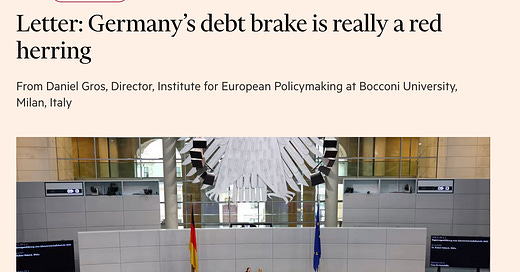Germany’s Debt Brake is Really a Red Herring
A Letter by the IEP@BU Director Daniel Gros Published in the Financial Times
Denmark, Europe’s champion in high-tech has been running budget surpluses for years. Loosening the debt brake to allow for more deficit spending on the industrial subsidies will not bring back prosperity to Germany
by Daniel Gros
Shahin Vallée’s op-ed on Germany’s debt brake (January 30) is yet another example of the popular narrative that the constitutional provision in Germany to limit the deficit, in normal times, to 0.35 percent of GDP is the main obstacle to prosperity.
A first charge leveled against the debt brake is that it impeded spending on infrastructure in the past (making it responsible for the sorry state of German infrastructure today).
A second one is that today it would not allow the government to engage in deficit spending on military and industrial policy.
As Vallée rightly noted, public sector infrastructure spending was too low even when the debt brake was not biting.
The main obstacle for higher spending was in reality insufficient planning and administrative capacity at the regional level (where most spending takes place) combined with pervasive popular resistance to any new road or rail project.
Modifying the debt brake to allow for more government investment would also not address the second charge since even the most creative accounting cannot transform spending on the military, or on industrial subsidies, into investment.
As for private sector investment, the German business sector is investing as much as the EU average (around 21 percent of GDP).
The economy is weak not because of a lack of investment, but because of the sectors it goes into. German industry has specialised in mid-tech sectors, like automotive, that are now under increasing competitive pressure from China.
Massive investment in high-tech sectors that could drive a recovery of the German economy is certainly desirable, but it can come only from the private sector.
Denmark, Europe’s champion in high-tech has been running budget surpluses for years. Loosening the debt brake to allow for more deficit spending on the industrial subsidies will not bring back prosperity to Germany.
This letter was published in the Financial Times on January 31, 2025.
Daniel Gros
Daniel Gros is Director of the Institute for European Policymaking @ Bocconi University.
Between 2020 and 2022 he was Distinguished Fellow and Member of the Board of the Centre for European Policy Studies (CEPS). Before that, was the director of CEPS from 2000. In 2020, he held a Fulbright fellowship and was a visiting professor at the University of California, Berkeley. In March-June, 2022 he was visiting Research Fellow at the Robert Schuman Centre of the European University Institute, Florence.
Gros is also currently an adviser to the European Parliament. Previously he worked at the International Monetary Fund and collaborated with the European Commission as economic adviser to the Delors Committee, which developed plans for the euro. He has been a member of high-level advisory bodies to the French and Belgian governments and advised numerous central banks and governments, including Greece, the United Kingdom, and the United States at the highest political level.
He has published extensively on international economic affairs, including on monetary and fiscal policy, exchange rates, banking, and climate change. He is the author of several books and editor of Economie Internationale and International Finance. He has taught at several leading European universities and contributes a globally syndicated column on European economic issues to Project Syndicate. He holds a PhD in economics from the University of Chicago.
IEP@BU Podcasts
Podcast: Why the Mainstream Approach to Sovereign Debt Sustainability is Flawed
The empirical evidence does not confirm the hypothesis that the public debt tends to be more stable in countries where the (real) interest rate is systematically lower than (real) growth. On the contrary
IEP@BU Events
Rules That Empower: The EU Digital Regulation in the Time of Elon Musk
February 11, 6 PM-7 PM - ONLINE
11/02/2025, 18:00 - 11/02/2025, 19:00
Digital platforms' market and political power and the rise of the AI industry present unprecedented policy challenges for EU regulators.
Bocconi University and Toulouse School of Economics present a brand new report drafted by the Institute for European Policymaking under the supervision of professor Francesco Decarolis: Rules That Empower: Turning EU Digital Regulation into a Catalyst for Innovation.
The EU needs to manage its digital regulation to promote innovation and prevent abuse in the digital sector. This report aims to investigate the efficacy of the current EU digital regulation, to identify areas of improvement, and to offer actionable policy proposals.
The report contains a fact-based analysis of the current EU regulation and policy proposals grounded in state-of-the-art scientific literature to favor innovation.
The report is the product of a one-year work by a multidisciplinary team composed of researchers in Economics, Management, and Law. The authors of the report are: Giovanni De Gregorio , Francesco Decarolis, Chiara Fumagalli, Bruno Jullien, Yassine Lefouili, Mariateresa Maggiolino, Michele Polo, Oreste Pollicino, and Claudio Tebaldi.
IEP@BU is organizing a preliminary presentation of the report on the occasion of the second anniversary of the approval of the Digital Markets Act (DMA), one of the major pieces of EU digital regulation that the report discusses in detail.
This event is directed primarily to IEP@Bu Media Fellows, a selected group of journalists and commentators who shape the conversation on EU policies at the EU level. However, the event is open also to scholars and the general audience.
Francesco Decarolis, the report coordinator and an IEP@BU fellow, will present the report's main conclusions with a focus on the DMA. A Q&A session will follow. Some of the authors of the report will attend the event and participate in the conversation.
Please, REGISTER HERE
When Will Germany Be Back?
February 24, 2:30 PM-3:30 PM - ONLINE
The day after the federal snap election, we will explore the European consequences of the vote against the backdrop of Germany’s economic challenges.
In November 2024, a coalition government collapsed when Chancellor Olaf Scholz dismissed Finance Minister Christian Lindner, highlighting Germany’s ongoing struggle to balance its political ambitions, renewed security priorities, and stringent budget rules.
For the first time in decades, the European Union faces a dual leadership vacuum in Germany and France—two pivotal member states in EU politics.
Meanwhile, geopolitical and economic challenges continue to escalate: the war in Ukraine demands unwavering commitment from the EU's leading states and institutions, and Donald Trump’s return to power introduces uncertainty to global economic and multilateral governance.
Join us as we debrief the European implications of the German federal elections with Wolfgang Munchau and Diana Pieper.
Speakers:
Wolfgang Munchau is one of the foremost commentators on EU economic and political affairs. He is the director of Eurointelligence and the author of the recent book Kaput: The End of the German Miracle.
Diana Pieper is a Berlin-based journalist with Die Welt and an IEP@BU Media Fellow.
Stefano Feltri, IEP@BU communication advisor, will moderate the conversation.
Please, REGISTER HERE
The IEP@BU Mission
Founded by Bocconi University and Institute Javotte Bocconi, the Institute for European Policymaking @ Bocconi University combines the analytic rigor of a research institute, the policy impact of a think tank, and the facts-based effort of raising public opinion’s awareness about Europe through outreach activities. The Institute, fully interdisciplinary, intends to address the multi-fold obstacles that usually stand between the design of appropriate policies and their adoption, with particular attention to consensus building and effective enforcement.
The Institute’s mission is to conduct, debate and disseminate high-quality research on the major policy issues facing Europe, and the EU in particular, its Member States and its citizens, in a rapidly changing world.
It is independent from any business or political influence.
The IEP@BU Management Council
Catherine De Vries, Dean for International Affairs and Professor of Political Science at Bocconi University
Daniel Gros, IEP@BU Director
Sylvie Goulard, IEP@BU vice-President, Professor of Practice in Global affairs at SDA Bocconi School of Management
Silvia Colombo, IEP@BU Deputy Director
Carlo Altomonte, Associate Professor at Bocconi University and Associate Dean for Stakeholder Engagement Programs at SDA Bocconi School of Management
Valentina Bosetti, professor of Environmental and Climate Change Economics at Bocconi University
Elena Carletti, Dean for Research and Professor of Finance at Bocconi University
Eleanor Spaventa, Professor of European Union Law at Bocconi Law School












